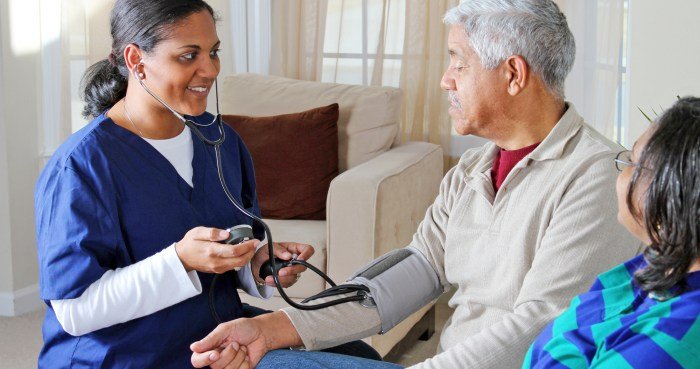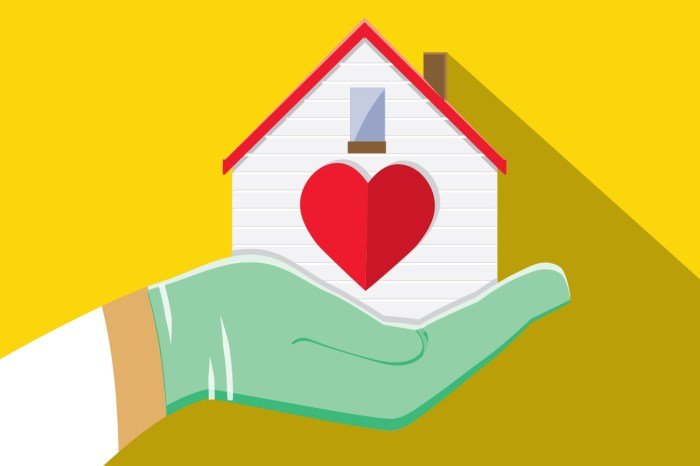Home health care agency New York offers a lifeline for individuals seeking quality medical care within the comfort of their homes. These agencies provide a wide range of services, from skilled nursing care to physical therapy, enabling patients to maintain their independence and well-being while navigating health challenges.
The significance of home health care in New York City is undeniable, as it caters to a diverse population with varying healthcare needs. Whether it’s managing chronic conditions, recovering from surgery, or simply requiring assistance with daily activities, home health care agencies play a crucial role in supporting individuals and families throughout their healthcare journey.
Home Health Care Agency Overview

Home health care agencies are essential providers of medical and supportive services to individuals in their homes. They offer a wide range of services tailored to meet the unique needs of each patient, allowing them to receive quality care in the comfort and familiarity of their own surroundings.Home health care plays a vital role in New York City, a densely populated metropolis with a diverse population.
It enables individuals to maintain their independence and quality of life while managing chronic conditions, recovering from illness or injury, and aging gracefully. This type of care is particularly crucial for seniors, individuals with disabilities, and those who require ongoing medical attention.
Types of Services Offered
Home health care agencies in New York City provide a comprehensive suite of services designed to meet the diverse needs of their patients. These services encompass a broad spectrum of care, including:
- Skilled Nursing Care:Registered nurses (RNs) provide a wide range of services, including wound care, medication administration, intravenous therapy, and post-operative care.
- Physical Therapy:Physical therapists (PTs) help patients regain mobility, strength, and function through exercises, stretches, and other therapeutic interventions.
- Occupational Therapy:Occupational therapists (OTs) assist patients in performing daily activities, such as dressing, bathing, and cooking, by adapting their homes and teaching compensatory techniques.
- Speech Therapy:Speech-language pathologists (SLPs) address communication disorders, swallowing difficulties, and cognitive impairments, helping patients regain their ability to speak, understand language, and swallow safely.
- Homemaker Services:Homemakers provide assistance with light housekeeping tasks, meal preparation, and personal care, enabling patients to maintain a safe and comfortable home environment.
- Medical Social Work:Medical social workers provide emotional support, counseling, and advocacy services, helping patients navigate the healthcare system and access community resources.
- Palliative Care:Palliative care teams provide specialized care for individuals with serious illnesses, focusing on pain management, symptom relief, and emotional support for both patients and their families.
Services Offered by Home Health Care Agencies in New York

Home health care agencies in New York offer a wide range of services designed to support individuals in their homes and promote their well-being. These services are tailored to meet the unique needs of each patient, providing personalized care and assistance with various aspects of daily life.
Skilled Nursing Care
Skilled nursing care is provided by registered nurses (RNs) and licensed practical nurses (LPNs) who are trained to assess and manage patients’ health conditions. This service includes:
- Administering medications, including injections and IV therapy
- Monitoring vital signs, such as blood pressure, heart rate, and temperature
- Wound care and dressing changes
- Providing education and support to patients and their families
- Developing and implementing care plans
Physical Therapy
Physical therapists (PTs) help patients regain mobility, strength, and function after an injury or illness. This service may involve:
- Exercises to improve range of motion, balance, and coordination
- Use of assistive devices, such as walkers, canes, and wheelchairs
- Pain management techniques
- Education on proper body mechanics and safe movement
- Home modifications to improve accessibility
Occupational Therapy
Occupational therapists (OTs) help patients perform daily activities and regain independence. This service may include:
- Adaptive strategies for dressing, bathing, and eating
- Cognitive rehabilitation for memory, attention, and problem-solving
- Home safety assessments and modifications
- Training in the use of assistive devices for daily tasks
- Activities to improve fine motor skills and hand-eye coordination
Speech Therapy
Speech-language pathologists (SLPs) work with patients who have communication, swallowing, or cognitive difficulties. This service may involve:
- Treatment for speech and language disorders, such as stuttering, aphasia, and dysarthria
- Swallowing therapy to prevent aspiration and improve swallowing safety
- Cognitive exercises to improve memory, attention, and problem-solving
- Augmentative and alternative communication (AAC) strategies
- Education and support for patients and their families
Homemaker Services
Homemaker services provide assistance with daily tasks, such as:
- Light housekeeping, including dusting, vacuuming, and laundry
- Meal preparation and grocery shopping
- Errand running
- Companionship and social interaction
- Personal care assistance, such as bathing and dressing
Personal Care Services
Personal care services provide assistance with activities of daily living, such as:
- Bathing, showering, and toileting
- Dressing and grooming
- Eating and feeding
- Ambulation and transfers
- Medication reminders and assistance
Hospice Care
Hospice care provides specialized medical and emotional support to individuals with a life-limiting illness. This service focuses on:
- Pain and symptom management
- Emotional and spiritual support for patients and their families
- Bereavement counseling and support
- Coordination of care with other healthcare providers
- Respect for the patient’s wishes and preferences
Other Services
In addition to these core services, home health care agencies in New York may offer other services, such as:
- Mental health counseling
- Social work services
- Transportation assistance
- Respite care for family caregivers
| Service | Description | Examples |
|---|---|---|
| Skilled Nursing Care | Provided by registered nurses (RNs) and licensed practical nurses (LPNs) to assess and manage patients’ health conditions. | Administering medications, monitoring vital signs, wound care, education and support. |
| Physical Therapy | Helps patients regain mobility, strength, and function after an injury or illness. | Exercises, use of assistive devices, pain management techniques, education on proper body mechanics. |
| Occupational Therapy | Helps patients perform daily activities and regain independence. | Adaptive strategies for dressing, bathing, and eating, cognitive rehabilitation, home safety assessments, training in the use of assistive devices. |
| Speech Therapy | Works with patients who have communication, swallowing, or cognitive difficulties. | Treatment for speech and language disorders, swallowing therapy, cognitive exercises, augmentative and alternative communication (AAC) strategies. |
| Homemaker Services | Provides assistance with daily tasks, such as light housekeeping, meal preparation, and errand running. | Dusting, vacuuming, laundry, meal preparation, grocery shopping, errand running, companionship. |
| Personal Care Services | Provides assistance with activities of daily living, such as bathing, dressing, and eating. | Bathing, showering, toileting, dressing, grooming, eating and feeding, ambulation and transfers, medication reminders. |
| Hospice Care | Provides specialized medical and emotional support to individuals with a life-limiting illness. | Pain and symptom management, emotional and spiritual support, bereavement counseling, coordination of care. |
Benefits of Choosing Home Health Care

Choosing home health care offers numerous advantages for individuals and their families. It provides a comfortable and familiar environment for recovery while ensuring access to high-quality medical care. This approach not only improves the patient’s quality of life but also offers significant financial benefits compared to traditional care settings.
Improved Quality of Life
Home health care allows patients to remain in the comfort and familiarity of their own homes, fostering a sense of independence and control over their recovery. This environment can contribute to reduced stress and anxiety, leading to faster healing and overall well-being.
Additionally, patients can maintain their daily routines and social connections, promoting a more positive outlook on their health journey.
Financial Advantages
Home health care can often be a more cost-effective option compared to traditional care settings like hospitals or nursing homes.
- Shorter Hospital Stays:Home health care can help prevent unnecessary hospital readmissions by providing ongoing support and monitoring, reducing the overall cost of care.
- Lower Overall Costs:Home health care services are generally less expensive than inpatient care, including costs associated with room and board, specialized equipment, and 24/7 nursing staff.
“Home health care can be a cost-effective alternative to traditional care settings, especially for patients with chronic conditions or who require ongoing support.”
Finding the Right Home Health Care Agency in New York

Navigating the world of home health care in New York can feel overwhelming, especially when you’re looking for the best possible care for yourself or a loved one. Choosing the right agency is crucial, as it directly impacts the quality of care received.
To help you make an informed decision, we’ll explore key factors to consider, steps for researching agencies, and a checklist to guide your evaluation process.
Factors to Consider When Choosing a Home Health Care Agency
It’s important to consider several factors when selecting a home health care agency to ensure it aligns with your needs and preferences.
- Services Offered:The agency should provide the specific services you require, such as skilled nursing care, physical therapy, occupational therapy, speech therapy, or home health aides.
- Location and Coverage Area:The agency should operate in your geographic area and have a network of caregivers who can conveniently visit your home.
- Insurance Coverage:Verify that the agency accepts your insurance plan and understand any co-payments or deductibles.
- Caregiver Qualifications:Inquire about the agency’s hiring process and the qualifications of its caregivers. Look for caregivers who are licensed, certified, and experienced in providing the specific type of care you need.
- Caregiver Availability:Consider the agency’s ability to provide caregivers at times that suit your schedule, especially for urgent or time-sensitive care needs.
- Communication and Responsiveness:The agency should have a clear communication process and be responsive to your questions, concerns, and requests.
- Reputation and Reviews:Research the agency’s reputation by reading online reviews, seeking recommendations from friends or family, or contacting your local Better Business Bureau.
- Cost and Payment Options:Understand the agency’s fees and payment options. Inquire about any discounts or financial assistance programs available.
Steps for Researching and Selecting a Reputable Agency, Home health care agency new york
Once you’ve considered the essential factors, you can start researching and selecting a reputable agency.
- Identify Your Needs:Determine the specific type of care you or your loved one requires, such as skilled nursing, physical therapy, or home health aides.
- Ask for Recommendations:Seek recommendations from friends, family, doctors, or other healthcare professionals who have experience with home health care.
- Research Online:Use online resources like the New York State Department of Health website, the Better Business Bureau, and online review platforms to find and evaluate agencies.
- Contact Agencies Directly:Reach out to agencies that meet your initial criteria and ask questions about their services, qualifications, and fees.
- Schedule a Consultation:Arrange a consultation with the agency to discuss your needs in detail and learn more about their approach to care.
- Compare and Contrast:After gathering information from multiple agencies, compare and contrast their offerings, qualifications, and fees to make an informed decision.
Essential Criteria for Evaluating Home Health Care Agencies
To make a well-informed decision, consider these essential criteria when evaluating home health care agencies:
- Accreditation and Licensing:Ensure the agency is accredited by a reputable organization, such as the Joint Commission, and holds the necessary licenses and certifications to operate in New York.
- Experience and Expertise:Look for an agency with a proven track record in providing quality home health care services, especially in your specific area of need.
- Caregiver Training and Background Checks:Inquire about the agency’s caregiver training programs and background check procedures.
- Patient Satisfaction:Read online reviews and testimonials to gauge the agency’s patient satisfaction rates.
- Communication and Coordination:Assess the agency’s communication channels, responsiveness to inquiries, and coordination with other healthcare providers.
Regulations and Licensing of Home Health Care Agencies in New York
Navigating the world of home health care in New York can feel overwhelming, especially when it comes to understanding the regulatory landscape. The state of New York has a robust system in place to ensure the quality and safety of home health care services.
This system includes strict licensing requirements and ongoing oversight, aimed at protecting both patients and their families.
Licensing Requirements for Home Health Care Agencies in New York
Home health care agencies in New York are required to obtain a license from the New York State Department of Health (DOH). This license ensures that the agency meets specific standards and regulations designed to guarantee quality care. To obtain a license, agencies must submit an application and undergo a rigorous review process.
- Agency Structure and Personnel:The DOH evaluates the agency’s organizational structure, including its administrative and clinical staff. This ensures that the agency has qualified personnel to manage and provide care.
- Physical Facilities:Agencies must meet specific standards for their physical facilities, including office space, equipment, and supplies. This ensures that the agency has a safe and appropriate environment for providing care.
- Service Delivery:The DOH assesses the agency’s ability to deliver a comprehensive range of home health care services. This includes services such as skilled nursing care, physical therapy, occupational therapy, and speech therapy.
- Financial Stability:The agency must demonstrate financial stability and the ability to operate effectively. This includes providing financial records and demonstrating sound business practices.
- Compliance with Regulations:Agencies are required to comply with all applicable state and federal laws and regulations. This includes adhering to patient privacy laws, infection control guidelines, and safety standards.
Verification of Legitimacy and Compliance
It is crucial to ensure that the home health care agency you choose is licensed and in good standing with the New York State Department of Health. You can verify an agency’s legitimacy and compliance by:
- Checking the DOH website:The New York State Department of Health maintains a searchable database of licensed home health care agencies. You can access this database online and verify the agency’s license status, address, and contact information.
- Requesting a copy of the agency’s license:You can request a copy of the agency’s license directly from the agency. This will provide you with official documentation confirming their licensing status.
- Asking for references:Ask the agency for references from previous clients or other healthcare providers. This can help you get a sense of the agency’s reputation and the quality of care they provide.
Case Studies and Success Stories
Home health care services have a profound impact on the lives of individuals and families, offering a range of benefits that extend beyond medical care. To illustrate the positive impact of home health care, we will explore several case studies and success stories that showcase the real-world benefits of this valuable service.
Impact of Home Health Care on Patient Recovery and Well-being
Home health care services can significantly improve patient recovery and well-being. This section will examine the benefits of home health care by presenting a case study of a patient who benefited from these services.
“Home health care provided me with the support I needed to recover from my surgery. I was able to stay in my own home, surrounded by my family, which helped me feel more comfortable and less anxious. The nurses were incredibly kind and patient, and they always made sure I understood my treatment plan.”
Navigating the world of home health care agencies in New York can be overwhelming, but there are options available to simplify the process. One such option is Cano Health , a company that provides comprehensive healthcare services, including home care.
Cano Health focuses on personalized care, ensuring that patients receive the support they need in the comfort of their own homes. This approach can be especially beneficial for those seeking personalized home health care services in the bustling city of New York.
Sarah, a home health care patient
The case study of Sarah demonstrates how home health care can contribute to a patient’s recovery by providing personalized care, fostering a sense of comfort and security, and ensuring the patient’s understanding of their treatment plan. Sarah’s experience highlights the benefits of home health care in terms of both physical and emotional well-being.
Future Trends in Home Health Care: Home Health Care Agency New York

The home health care industry is constantly evolving, driven by technological advancements and a growing demand for personalized and accessible care. As the population ages and healthcare costs continue to rise, home health care is poised for significant growth and innovation.
Emerging Technologies and Advancements
Emerging technologies are revolutionizing the way home health care is delivered, enhancing patient care and improving efficiency.
Finding the right home health care agency in New York can be a challenge, but it’s crucial for ensuring the best possible care for your loved one. Many agencies offer specialized services, like those provided by carestl health , which focuses on personalized care plans tailored to individual needs.
When choosing a home health care agency in New York, consider factors like experience, qualifications, and patient satisfaction to make an informed decision.
- Telehealth and Remote Monitoring: Telehealth platforms allow patients to connect with healthcare professionals virtually, enabling remote consultations, medication management, and monitoring of vital signs. Remote patient monitoring devices, such as wearable sensors and smart home technology, provide real-time data to healthcare providers, allowing for proactive interventions and improved patient outcomes.
For example, a patient with chronic heart failure can wear a wearable device that monitors their heart rate and blood pressure, sending alerts to their doctor if any concerning changes occur. This allows for early intervention and prevents potential hospitalizations.
- Artificial Intelligence (AI) and Machine Learning (ML): AI and ML algorithms are being used to analyze patient data, predict potential health risks, and personalize care plans. For example, AI-powered chatbots can provide patients with 24/7 support and answer their questions about their health conditions and medications.
ML algorithms can analyze patient data to identify patterns and predict the likelihood of future health complications, allowing for proactive interventions.
- Robotics and Automation: Robotic devices are being developed to assist with tasks such as medication dispensing, mobility assistance, and wound care. This frees up healthcare professionals to focus on more complex patient needs and provides patients with greater independence. For example, robotic arms can assist patients with limited mobility in performing daily tasks such as dressing and eating.
Potential Future Trends
The future of home health care is bright, with several emerging trends shaping the industry.
Home health care agencies in New York provide vital support to individuals who need assistance with daily living activities. One initiative that addresses healthcare access challenges is the Clinton Health Access Initiative, which works to improve healthcare systems globally.
What is Clinton Health Access Initiative While their focus is international, their work provides valuable insights into healthcare access and equity, which can inform the development of home health care services in New York and beyond.
- Increased Focus on Prevention and Wellness: Home health care agencies are increasingly shifting their focus from reactive care to proactive prevention and wellness programs. This includes providing education on healthy lifestyle choices, managing chronic conditions, and promoting early detection of health issues.
- Integration of Home Health Care with Other Healthcare Settings: There is a growing trend towards seamless integration of home health care with other healthcare settings, such as hospitals and skilled nursing facilities. This ensures a smooth transition of care and reduces fragmentation in the healthcare system.
- Growing Demand for Personalized Care: Patients are increasingly demanding personalized care plans that are tailored to their specific needs and preferences. This includes considering cultural and social factors, as well as individual health goals.
Impact on Accessibility and Effectiveness
These trends are expected to have a significant impact on the accessibility and effectiveness of home health care.
- Increased Accessibility: Telehealth and remote monitoring technologies are expanding access to home health care services, particularly in rural areas and underserved communities. These technologies remove geographical barriers and allow patients to receive care from the comfort of their own homes.
- Improved Effectiveness: The use of AI, ML, and robotics is expected to enhance the effectiveness of home health care by providing more personalized and data-driven care. This can lead to better patient outcomes, reduced hospital readmissions, and improved quality of life.
Conclusive Thoughts
Navigating the world of home health care can be overwhelming, but with careful consideration and research, you can find the right agency to meet your specific needs. Remember, home health care is a valuable resource that empowers individuals to regain their independence and thrive in their own homes.
By choosing a reputable agency and understanding the benefits and services available, you can access quality care and support that improves your overall well-being.
FAQ Corner
What are the qualifications of home health care professionals?
Home health care professionals are licensed and certified in their respective fields, ensuring they possess the necessary skills and knowledge to provide safe and effective care.
How can I find a reputable home health care agency in New York?
You can start by asking for referrals from your doctor, friends, or family. Additionally, you can research online reviews and check the agency’s licensing and accreditation status.
Is home health care covered by insurance?
Most health insurance plans cover home health care services. However, it’s essential to contact your insurance provider to confirm coverage and understand any co-payments or deductibles.